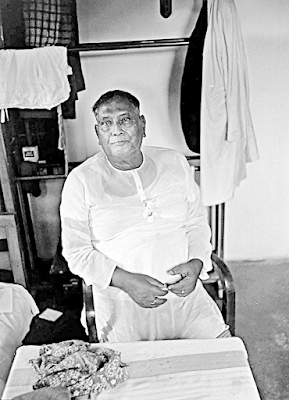 |
| Lt-Gen Niazi with Lt-Gen Jagjit Singh Aurora of the Indian Army arriving together at the Ramna Race Course in Dhaka on December 16, 1971. (Courtesy: Raghu Rai/Dawn) |
In a speech at the Race Course Ground on March 21, 1948, Muhammad Ali Jinnah said: “The state language of Pakistan is going to be Urdu and no other language.” He repeated this message in his convocation address at the Curzon Hall of the University of Dhaka, on March 24, 1948, even as members of the audience protested, and then reiterated it in a radio speech.
The seeds of dissent and disruption, as they say, were sown in those early days, leading to violent rioting in East Pakistan in 1952 with severe government action, under the new Bengali, but Urdu-speaking, prime minister Nazimuddin.
Protesters were killed in police firing, fuelling further unrest. The language movement gave birth, among other things, to the Awami Muslim League, later becoming the Awami League in 1955, and the erection of the Shaheed Minar, or Martyrs’ Column. February 21 was marked as Shohid Dibosh, or Martyrs’ Day, later to become a national holiday in Bangladesh.
Many say the 'fallout of Mr Jinnah’s statement in 1948 in Dhaka' about Urdu alone being the national language was intense.
Even the inclusion of Bengali as a national language along with Urdu in the 1956 constitution could not atone for the original hurt !!
(Now I have a personal version on social structures vis-a-via Language issue in Bangladesh, and especially about Bengali Muslims.
There are some words which are used liberally by Bangladeshis, and these are absolutely Hindu names and related to the Hindu way of life.
** Shonir Dosha ---- implying bad/tough times -- linked to Hindu belief vis-a-vis Shani Dev
*** Lakhhi bou --- 'blessed and virtuous daughter-in- law'.
*** Bangladeshi citizenry also use Bengali Hindu names liberally.
In one Bangali TV/web drama (Natok), I found a character named Mithila.
The protagonist is asked -- Do you the meaning of Mithila or how the name came?
And the response is -- Mithila is a name of kingdom. There is nothing wrong in it.
But I thought the writer was 'deliberate' in clarifying also that Mithila was the name of the kingdom of Sita's father Janak (reference Ramayana). )
On December 16 in 1971, after a nine-month-long war, Bangladesh was born as an independent country under the leadership of the Father of the Nation Bangabandhu Sheikh Mujibur Rahman, says a report in leading Bangaldesh newspaper 'The Daily Star'.
(Bangladesh President Mohammed Shahabuddin and Prime Minister Sheikh Hasina today paid rich tributes to the martyrs of the 1971 Liberation War by placing wreathes at the National Memorial in Savar on the outskirts of Dhaka marking the 53rd Victory Day.)
AK Fazlul Huq (Prime Minister of undivided Bengal has become a victim of Partition)
"In the 1937 election, Huq defeated the League, and there was an improvement in Congress's performance in the election as well. However, the myopic central leadership of the Congress failed to realize the importance of forming a coalition ministry with the KPP. Huq was unprepared for this situation.
In that critical juncture, shrewd Jinnah instructed his followers to accept the Huq-League Coalition Ministry, with Fazlul Huq as the leader. Jinnah had the ambition to control the important province of Bengal, and Huq aspired to be its Premier; here, the interests of the two great leaders converged.
"However, Huq was opposed to the Two Nation Theory, staunchly put forward by Jinnah and his followers. For example, Huq delivered a lengthy speech in Calcutta on January 8, 1942, to commemorate the fifty-eighth death anniversary of the great eclectic Brahmo leader Keshab Chandra Sen, who can be regarded as a pioneer of comparative religious studies in modern South Asia.
"On that occasion, Huq pointed out, "There is no real diversity in religion. All religions must be one… The future of India would be decided not by strife but by harmony, and those who tried to bring about harmony and concord would be the greatest benefactors of the country." Of course, the League leadership became suspicious of Huq's activities and tried their best to isolate him politically.
Huq stated that the League had lost its relevance and expressed his desire to establish a progressive Muslim League at the all-India level. An organizing committee was set up in Calcutta, with the Nawab of Dacca as President and Syed Badruddoza as the Secretary.
In this context, Huq reiterated, "Unity between Muslims and other communities is a fundamental necessity for the political advancement of India." However, neither the Congress nor the left parties could utilize the potential of this politician for India's freedom struggle.
On the other hand, the ruthless League leaders, under the indulgence of Jinnah, made an all-out effort to curb his political influence. India's slide toward vivisection accelerated.
(article penned by Dr. Amit Dey holds the position of Sir Ashutosh Mukherjee Professor of History at the University of Calcutta)
(AK Fazlul Huq at his home, Burdwan House, on Eid day in 1954. Photo: James Burke/Daily Star)









No comments:
Post a Comment